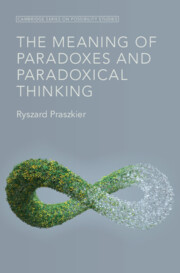Book contents
- The Meaning of Paradoxes and Paradoxical Thinking
- Cambridge series on possibility studies
- The Meaning of Paradoxes and Paradoxical Thinking
- Copyright page
- Contents
- Figures
- Tables
- Acknowledgments
- Introduction
- Part 1 Paradoxes and What They Do to Us
- Part II Sudden Unexpected Changes
- Part III Challenging the Impossible
- Part IV Peace and Its Challenges
- Introduction
- Chapter 10 Peace-Oriented Mindset (POM)
- Chapter 11 POM Heroes
- Discussion and Summary
- Part V Paradoxes and Creativity
- Part VI Paradoxes in Action
- References
- Index
Chapter 10 - Peace-Oriented Mindset (POM)
from Part IV - Peace and Its Challenges
Published online by Cambridge University Press: 04 April 2025
- The Meaning of Paradoxes and Paradoxical Thinking
- Cambridge series on possibility studies
- The Meaning of Paradoxes and Paradoxical Thinking
- Copyright page
- Contents
- Figures
- Tables
- Acknowledgments
- Introduction
- Part 1 Paradoxes and What They Do to Us
- Part II Sudden Unexpected Changes
- Part III Challenging the Impossible
- Part IV Peace and Its Challenges
- Introduction
- Chapter 10 Peace-Oriented Mindset (POM)
- Chapter 11 POM Heroes
- Discussion and Summary
- Part V Paradoxes and Creativity
- Part VI Paradoxes in Action
- References
- Index
Summary
Top-down solutions or conflict resolution attempts led by external experts are often short-lived: after a limited period, the suppressed conflict starts to resurface or even explode once again. People become accustomed to living in a conflict-ridden environment. They adapt mentally and economically to the presence of conflict. When peace is suddenly “imposed” from the outside, people feel lost and disempowered in the new, unfamiliar, conflict-free environment. The challenge lies in transforming the sociopsychological environment into one that promotes peace. The complex systems approach has appeared useful in interrupting and preventing protracted conflicts (e.g., those in Mozambique and South Sudan). A specific approach driven by a particular mindset is required to establish the psychological context needed for peacemaking, called here a Peace-Oriented Mindset (POM). The process of constructing and validating the proposed POM questionnaire is delineated. The three basic dimensions (cognitive, performative, and doability) were confirm by factor analysis. Cross-segment analysis revealed that women achieved significantly higher POM scores than men.
Keywords
- Type
- Chapter
- Information
- The Meaning of Paradoxes and Paradoxical Thinking , pp. 83 - 87Publisher: Cambridge University PressPrint publication year: 2025

